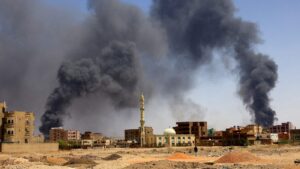
The National Interest Foundation Newsletter
Issue 199, July 21, 2023
Welcome to our NIF Newsletter. In this week’s headlines: we analyze the intensifying protests as Netanyahu’s extreme right-wing Israeli government tampers with the judiciary, examine the potential effects of ending the Black Sea grain deal, look into the Sudanese Armed Forces’ return to negotiations, and investigate the U.S. military’s plan to increase its presence in the Gulf.
Written by Jacob Van Veldhuizen and Toni JeBailey
Protest in Israel Intensify

Protests will continue to intensify as the vote to gut Israel’s judicial branch grows near. (Photo from AP)
Protests Intensify as Netanyahu’s Extreme Right Wing Israeli Government Tampers with Judiciary
As the final vote regarding an overhaul of the judiciary capabilities within Israel quickly approaches, the protests regarding these changes have intensified. Israel’s parliament is set to vote this upcoming Sunday and Monday. The bill would remove specific capabilities of the Israeli judicial branch while strengthening legislative powers, such as reducing the “reasonability” clause that allows the judiciary to overturn government decisions, allow for greater government control of judge appointments, and provide more direct power to parliament regarding decision-making. The most prominent proponents of the change are members of Netanyahu’s nationalist and religious government, citing this bill as necessary to reduce judiciary power and conduct effective governing. However, opposition remains consistent as Israeli protesters view this as an infringement of the balance of the Israeli government, as the bill provides too much power to parliament and prohibits the Supreme Court from upholding civil rights and liberties. As the bill moves into its final vote after it was tabled for three months with hopes of an external compromise being accomplished, the momentum of the bill’s fastrack approval coincides with the increase of public protests in Israel.
Contention regarding the judiciary overhaul bill has split the state into two broad stances, those who agree with Netanyahu’s far-right government and its promotion of nationalism and religious extremism and those who want a more secular and pluralist state. Nationwide protests have continued for 28 weeks since the bill’s initial introduction at the beginning of this year, with the magnitude of demonstrations increasing as the final vote approaches. This past Tuesday marked the “day of disruption,” in which protesters committed to disrupting daily practices to raise awareness for their opposition. This included a two-hour strike by doctors outside of Ichilov Hospital in Tel Aviv and the protesting of “‹”‹161 of the corps’ reserve officers. With the “day of disruption” planned to continue throughout the week until the final vote, the effects of protests and strikes on the daily happenings and economy of the state are yet to be fully realized.
The protests have intensified as Netanyahu remained hospitalized from dehydration on Saturday. He was officially discharged on Monday, reaffirming his commitment to the bill’s passing and its prevention of questioning the “reasonability” of parliamentary decisions. As Netanyahu is still undergoing a long-standing corruption trial since 2020, his commitment to the bill and judiciary overhaul has oppositional protesters questioning the checks and balances within the Israeli government, particularly the Supreme Court’s decreasing ability to regulate the other branches of government. This, combined with Netanyahu’s increasingly far-right cabinet and government, garners fears amongst Israelis concerned about the religious and nationalist interests promoted by these individuals. More significant concerns lie within the security of Israel’s government and economy moving forward, as the shekel has fallen more than 5 percent since the bill was introduced.
With no indication of the overhaul’s potential for failure in parliament, the bill is expected to pass as early as this weekend, but most likely sometime next week. Protests are also likely to continue, with more massive demonstrations scheduled for the upcoming week. As the actual effects of this decision are yet to be demonstrated in Israel, only time will tell the negative consequences this judicial overhaul has on government trust, the economy, and the promotion of Israel’s democracy.
End of the Black Sea Grain Deal?

Food prices will skyrocket if the Black Sea Grain Deal ends. (Photo from Reuters)
The Implications of Ending the Black Sea Grain Deal
Russia announced this past Monday the termination of the year-old agreement that allowed Ukraine to export grain through the Black Sea, despite Moscow’s naval blockade. The deal was brokered with help from the United Nations and Turkey in July 2022, with its main intention being to regulate stable global food prices and allocate resources to countries facing food scarcity after Russia’s initial naval blockade of Ukrainian ports at the start of the war. With the original deal only in place for 120 days, it has been renewed three times to accommodate global food demands until Russia’s recent suspension. Ukraine is a major global exporter of grain and other food sources and fertilizers. Over 32.8 million tons of food have been sent since the deal was established. The food and resources reach as far as Somalia, Ethiopia, and Kenya, all countries that are increasingly vulnerable due to the worst regional drought in decades. Over 20 million people are facing food insecurity as a result. The Horn of Africa relies on exports from Russia and Ukraine to sustain up to 80% of their population’s food needs. Russia’s suspension of the grain deals puts the sustained global prices for food at risk and their overall accessibility moving forward.
The deal’s suspension came hours after an attack on the Kerch Strait Bridge, an essential Crimean military passage for Russian forces. The bridge connects Russia to the Crimean Pennisula and South Ukraine via land, with Vladimir Putin publicly condemning the attack citing the current lack of military utilization and placing blame on Ukraine. There was immediate retaliation, as Russian forces launched missiles on Tuesday toward the Ukrainian city of Odesa, a key export port for grain. The Kremlin later stated that this blast did not correlate with the government’s stance towards the grain deal, with their reasoning for withdrawal being an inefficient delivery of food supplies and continued attacks by Ukrainian forces. While sanctions are not placed directly on Russian food products, the Kremlin has cited that these sanctions impede regional production and trade efforts. As Russia cannot purchase agricultural machinery from abroad and remains disenfranchised from the global SWIFT payment network, government officials point to removing these barriers necessary for Russia to resume its participation and allow trade across the Black Sea.
As the global economy continues to grapple with the effects of high inflation and cuts in production due to the COVID-19 Pandemic, the subsequent consequences of Russia’s suspension will be felt directly in both food prices and availability. Following the news of the Kremlin’s withdrawal, U.S. Secretary of State Antony Blinken stated that Russia was “weaponizing food” amidst the ongoing war with Ukraine. It will be harder to deliver food to high-demand areas. Coinciding with higher prices, it will simultaneously damage Ukraine’s economy as they rely on food exportation as a significant revenue stream. With Ukrainian production already down 35-40% due to the war, the deficit will continue to increase regarding the global food supply.
With over 345 million people facing food insecurity worldwide, the suspension of the grain deal exacerbates an already severe global crisis. Turkish President Recep Tayyip Erdogan went on record after the news broke to reaffirm Turkey’s commitment to reinstating and extending the deal, as he noted that Putin also “wants this humanitarian bridge to continue.” Ukrainian President Volodymyr Zelenskyy also spoke to reporters regarding the possibility of exportation across the Black Sea to continue without Russia’s facilitation or participation, yet it is still unknown about the plausibility or logistics of this plan. Regardless, the effects of Russia’s withdrawal will be felt imminently in both Ukraine and the Horn of Africa as food prices begin to rise and supplies dwindle. As Russia continues to use food as a bargaining chip in the greater scheme of its war with Ukraine, the consequences will be felt on all levels as the global food crisis worsens.
SAF Returns to Negotiations

Despite the SAF’s return to negotiations, the war in Sudan continues to escalate. (Photo from Reuters)
Sudanese Armed Forces Return to Negotiations
Representatives of the Sudanese Armed Forces (SAF) have returned to Jeddah to resume negotiations with the Rapid Support Force (RSF). This comes over a month after the SAF pulled out of the talks in May. The SAF’s return to the negotiating table should be celebrated, but it is unlikely that this return is indicative of any coming end to the conflict.
In May, the SAF suspended its participation in the talks, citing the RSF’s “repeated” violation of humanitarian ceasefires. This return to negotiations is a positive step, though it is unlikely to yield immediate results. The fighting in Sudan continues to intensify, but neither side has been able to win a decisive victory over the other. The SAF has been trying to regain control of areas in the capital city of Khartoum but has so far been unsuccessful. The RSF has been trying to take control of Sudanese military bases but has also failed to do so. This ongoing stalemate will have one of two outcomes. The generals may continue fighting to try and gain some advantage during negotiations, or they will come to the negotiating table to find a peaceful solution before their forces are depleted. Based on past events, the former option is more likely, however, any negotiations are better than none. The RSF has yet to release a comment on their return to the negotiating table.
An attempt was made by the Intergovernmental Authority on Development (IGAD), an East African bloc, to restart negotiations in Ethiopia. These negotiations were to be led by Kenyan President William Ruto. The SAF refused to participate, accusing Ruto of showing favoritism towards the RSF.
Both sides have indicated they are open to solving the conflict through negotiations. The leader of the RSF, Mohamad Hamdan Dagalo, indicated in a statement posted on Twitter that dialogue is essential to reaching a political solution.
Prior talks in Jeddah had been mediated by Saudi Arabia and the United States. Both mediators became increasingly frustrated as neither side seemed interested in following through on any of the truces agreed to. After the SAF pulled out of the talks in May, the mediating countries decided to suspend the negotiations in Jeddah. In the past, negotiations between the warring parties have been mixed at best. Every short-term ceasefire has been violated to an extent and each side blames the other. It has been reported by witnesses that each side is guilty of violating past truces. Each side has also been accused of raiding aid shipments, occupying hospitals, and killing civilians.
External powers are using their influence to try and affect the outcome of this conflict. This will make negotiations more difficult. The SAF enjoys the support of Egypt, while the RSF is being supported by Russia and the United Arab Emirates through Libya and the Wagner Group. Pumping in more weapons will only continue to escalate the conflict and allow both sides to fight longer.
So far, there has been no indication of any approaching breakthroughs, but it is still very early in the renewed negotiation efforts. These negotiations bring some hope that a peaceful solution may be possible in the future, but with the current intensity of fighting, it appears unlikely. In the end, the people who will suffer the most will be the Sudanese civilians. Over 3,000 have already been killed with millions more fleeing. Those that have fled across the border into other countries face other hardships as these countries struggle to facilitate the sudden influx of refugees. Despite previous failures, it is important to keep negotiations going, as it is the best chance for a speedy end to the conflict.
The U.S. Military in the Middle East

The U.S. military’s increasing presence in the Gulf will likely increase tensions between the U.S. and Iran. (Photo from USAF)
U.S. Military to Increase Presence in the Gulf
Continuing the monitoring of the Strait of Hormuz, the United States has committed to sending F-35 and F-16 fighter jets in addition to the previous military shipments to the Middle East. This is an effort dating back to a commitment from the Biden administration this past May to increase its presence and control of the region. The Strait of Hormuz, located between Iran and Oman, is an area of great contention as about a fifth of the world’s crude oil and oil products are transported using the sea passage. Since 2019, the region has faced multiple military transgressions, the most recent being Iran’s recent attempt to seize two oil tankers earlier this month. The United States’ recent shipment of jets aims to help deter future attacks of a similar nature, in addition to providing more military resources for the U.S. to monitor nearby situations in Russia and Syria.
After President Trump’s withdrawal from the Joint Comprehensive Plan of Action (JCPOA) in 2015, tensions between the two powers have continued to escalate, especially within the Strait of Hormuz. Immediately following the U.S.’s unilateral suspension of the JCPOA deal was a series of reinstated sanctions on Tehran, intended to leverage their nuclear programs with limits on international trade. Most recently, new sanctions were imposed that imposed limits on Iranian energy exports and petroleum sales and trade. Iran has continued to increase its nuclear capabilities, now having the ability to make the fissile material for a nuclear bomb in an estimated 12 days, compared to the full year it took back when the deal was in place.
Despite these sanctions, Iran has attempted multiple methods of evasion to continue its participation in the global market. Recently, Iraqi officials constructed a deal to barter oil for gas with Iran, attempting to curtail the sanctions by using a loophole of “bartering” rather than financial transactions. Iraq heavily relies on Iran to sustain its energy needs, as conflict and government mismanagement have created a long-term issue of electricity shortages within the country. While the U.S. has previously provided exemptions regarding Iraq and Iran trade for Iraq to meet its energy needs, the U.S.’s recent tightening of Iraq’s foreign reserves. This happened under suspicion that Iraqi funds were being transferred to Iran and calls into question if the U.S. will crack down on the bartering deal.
The U.S. claims its increase in military presence allows for more assistance in the Strait of Hormuz and an opportunity to monitor Russia’s military involvement closely. With Russia’s increasing military aggression and presence within Syria, the shipment of F-35 and F-16 fighter jets will allow the U.S. to pursue military action in response to Russia if needed. This increasing pressure from Russia alongside Iran aims to force the U.S. out of Syria, where over 900 U.S. forces are present. With no clear indication of where the jets are specifically being sent or for how long, it appears that they will be utilized on a needs basis to address security concerns within the region. As Russia and Iran continue their new trends of political and diplomatic realignment within the broader Middle East, only time will indicate what capacity the U.S. jets could potentially be deployed.
